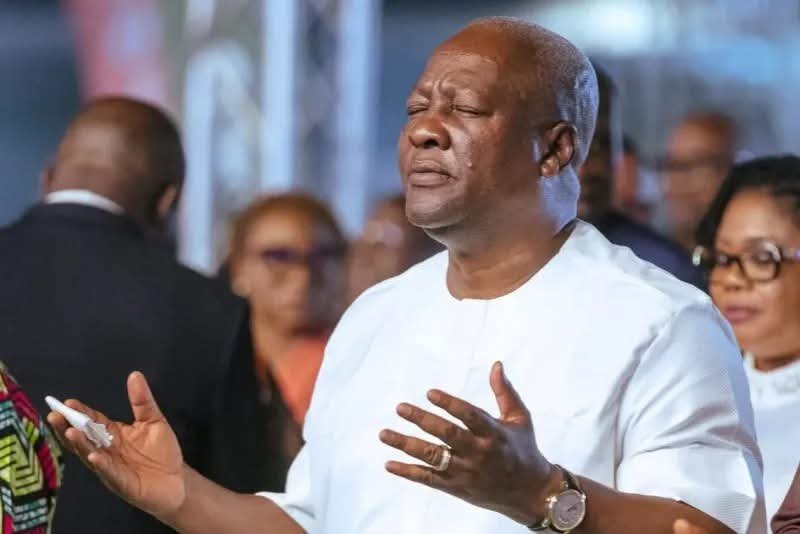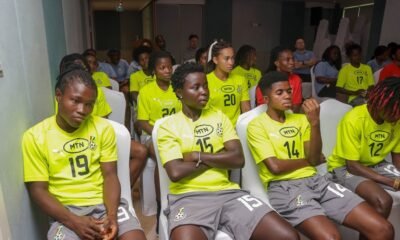News
Crime and immorality would be worse without the Church – Mahama

President John Mahama has addressed growing concerns over the increasing levels of crime and immorality in Ghana, even though over 90% of the population identifies as religious.
He emphasised that while these issues remain a challenge, the presence of the Church has played a significant role in curbing them, arguing that the situation could be far worse without its moral influence.
Speaking to the clergy in Kumasi on Sunday, President Mahama refuted claims that religion has failed to shape moral values in the country.
He asserted that, contrary to such arguments, the Church has been instrumental in guiding society.
“There is an often-heard argument that while more than 90% of Ghanaians profess to be persons of faith, immorality and crime are on the rise. My answer to those who make this argument is that the situation would probably have been far worse if there were no Church,” he remarked.
He further explained that the Church serves as a moral compass, shaping the behaviour of individuals and communities. Without its presence, he warned, society would risk plunging into chaos.
“Imagine a scenario where there was no Church, and people could act without any moral restraint. The situation would undoubtedly be worse. The churches are doing their best, and their efforts must be acknowledged,” he added.
President Mahama also stressed the importance of unity among Christian denominations, cautioning that divisions within the Church diminish its influence.
He noted that a fractured Christian community weakens the collective voice of faith leaders in addressing national issues.
“It is essential to emphasise the importance of fostering unity among Christian denominations. A divided Church weakens its impact,” he stated
He concluded by urging churches to work together in promoting national development and moral discipline.
“But a united Church can transform society. Let us work together to build a vibrant and influential Christian community that speaks with one voice on issues of national development,” he said, reinforcing his call for cooperation among religious bodies.
Source: Myjoyonline.com
News
Man sentenced to 25 years for robbery at Manso Akwasiso

A 30-year-old man has been sentenced to 25 years imprisonment with hard labour by the Bekwai Circuit Court for his role in a 2022 robbery at a mining site at Manso Akwasiso in the Ashanti South Region.
The convict, Dominic Ofori, also known as Fanta, was arrested on 16th February 2026 after years on the run. He pleaded guilty before the Bekwai Circuit Court to robbery contrary to Section 149 of the Criminal Offences Act, 1960 Act 29, and was accordingly sentenced to 25 years imprisonment with hard labour.
On March 20, 2022, the Manso Adubia District Police received intelligence that a group of armed men from Manso Abodom were planning to attack a mining site at Manso Akwasiso to rob the owner of gold concentrate. Acting on the information, police mounted a coordinated operation and laid an ambush at the site.
At about 5:30 pm the same day, four-armed men arrived at the site, fired indiscriminately, and robbed the miners of their gold concentrate. The police team on surveillance intervened, resulting in an exchange of gunfire.
Three of the suspects, Abu Abubakar, Musah Latif, and Gideon Takyi, sustained gunshot wounds and were pronounced dead on arrival at St Martins Catholic Hospital at Agroyesum. Dominic Ofori escaped at the time but was later arrested and put before the court.
The Ashanti South Regional Police Command has assured the public of its continued commitment to combating violent crimes and bringing offenders to justice.
News
Ashanti police arrest man for publishing false news on TikTok

The Ashanti Regional Police Command has arrested 45-year-old Isaac Boafo, also known as “Duabo King,” for allegedly publishing false news intended to cause fear and panic.
Police said the arrest follows a viral TikTok video in which Boafo claimed that four officers at the Central Police Station in Kumasi engaged in inappropriate conduct with commercial sex workers during night patrols in Asafo.
Officers from the Police Intelligence Directorate (Ashanti Region) apprehended Boafo after receiving intelligence about the video.
During questioning, he admitted to creating the video to attract views and engagement online, and acknowledged that he could not prove the allegations.
Boafo also admitted making comments about the President of the Republic for content purposes and could not defend those statements.
He has been formally charged and is in detention as investigations continue.
The Ashanti Regional Police have warned the public against publishing or sharing false information on social media, noting that such acts can cause fear, panic, and damage reputations.
They said anyone found engaging in similar conduct will face legal action.
By: Jacob Aggrey














